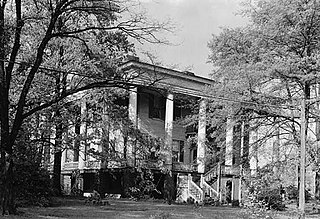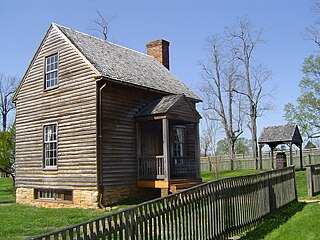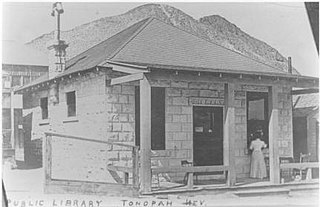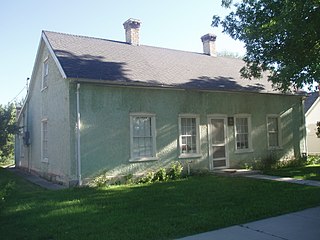
Oak Alley Plantation is a historic plantation located on the west bank of the Mississippi River, in the community of Vacherie, St. James Parish, Louisiana, U.S. Oak Alley is named for its distinguishing visual feature, an alley or canopied path, created by a double row of southern live oak trees about 800 feet long, planted in the early 18th century — long before the present house was built. The allée or tree avenue runs between the home and the River. The property was designated a National Historic Landmark for its architecture and landscaping, and for the agricultural innovation of grafting pecan trees, performed there in 1846–47 by a gardener.

The Myrtles Plantation is a historic home and former antebellum plantation in St. Francisville, Louisiana, United States built in 1796 by General David Bradford.

Gunston Hall is an 18th-century Georgian mansion near the Potomac River in Mason Neck, Virginia, United States. Built between 1755 and 1759 as the main residence and headquarters of a 5,500-acre (22 km2) plantation, the house was the home of the United States Founding Father George Mason. The home is located not far from George Washington's home.

Rosedown Plantation State Historic Site is an 8,000-square-foot (740 m2) historic home and former plantation located in St. Francisville, Louisiana, United States. Built in 1835 by Daniel and Martha Turnbull, it is one of the most documented and intact plantation complexes in the Southern United States. It is known for its extensive formal gardens surrounding the house.

San Francisco Plantation House is a historic plantation house in Reserve, St. John the Baptist Parish, Louisiana. Built in 1853–1856, it is one of the most architecturally distinctive plantation houses in the American South. It was declared a National Historic Landmark in 1974. It is now a museum and event facility.

Rattle and Snap is a plantation estate at 1522 North Main Street in Mount Pleasant, Tennessee. The centerpiece of the estate is a mid-1840s mansion that is one of grandest expressions of the Greek Revival in Tennessee. It was designated a National Historic Landmark in 1971 for its architecture, and for its association with the Polk family, once one of eastern Tennessee's largest landowners. The house is privately owned, but may be viewed by appointment.

The Tupper-Barnett House is a historic house located at 101 US 78B in Washington, Georgia. Built as a high-end Federal style residence, it was augmented about 1860 with one of the nation's finest examples of a full peristyle Greek Revival colonnade. It was declared a National Historic Landmark on November 7, 1973.

Tulip Hill is a plantation house located about one mile from Galesville in Anne Arundel County in the Province of Maryland. Built between 1755 and 1756, it is a particularly fine example of an early Georgian mansion, and was designated a National Historic Landmark in 1970 for its architecture.

George Washington's Gristmill was part of the original Mount Vernon plantation, constructed during the lifetime of the United States' first president. The original structure was destroyed about 1850. The Commonwealth of Virginia and the Mount Vernon Ladies’ Association have reconstructed the gristmill and the adjacent distillery. The reconstructed buildings are located at their original site three miles (4.8 km) west of the Mount Vernon mansion near Woodlawn Plantation in the Mont Vernon area of Fairfax County. Because the reconstructed buildings embody the distinctive characteristics of late eighteenth century methods of production and are of importance to the history of Virginia, the site is listed on the National Register of Historic Places despite the fact that the buildings are not original.

The Jones Law Office, also known as the Lorenzo D. Kelly House, is a structure within the Appomattox Court House National Historical Park. In the nineteenth century the structure was owned by Kelly and used as a single-family house. The original law office was also used as a dwelling by John Robinson for his large family in the nineteenth century after Kelly.

The Tonopah Public Library in Tonopah, Nevada was the third public library in Nevada.The one story stone building was designed by John J. Hill and was completed in 1906. The library was established by local residents Grace R. Moore and Marjorie Moore Brown to house a gift of 200 books from George F. Weeks.
The Arlington Plantation House in Washington, Louisiana is an antebellum plantation house with an unusual design that was built in 1829. It was listed on the National Register of Historic Places in 1982.

The Robert C. McEwen United States Custom House, also known as U.S. Customshouse, is a historic customshouse building located at Ogdensburg in St. Lawrence County, New York. It was built in 1809-1810 as a store and warehouse. It is a two-story, utilitarian, gable roofed, stone bearing wall structure approximately 60 feet wide and 120 feet long. The Federal government purchased it in 1936 and converted it for use as a customshouse. It is the oldest within the building inventory of the General Services Administration.
Cashpoint Plantation House, also formerly known as Ash Point and Woodlawn, is located shortly north of Louisiana Highway 71 between Taylortown and Elm Grove in Bossier Parish, Louisiana. It was built in about 1875 and added to the National Register of Historic Places on August 11, 1982.

Ardoyne Plantation House is located on Highway 311 in Schriever, Louisiana, just northwest of Houma, Louisiana. It was built 1894 and added to the National Register of Historic Places on November 1, 1982.
Island Home is a historical house in Rapides Parish, Louisiana, in or near Gardner. It was built around 1850 and listed on the National Register of Historic Places in 1984.

Lansdowne is a historic mansion that is listed on the National Register of Historic Places in Natchez, Adams County, Mississippi. It was originally built as the owner's residence on the 727-acre, antebellum, Lansdowne Plantation. The mansion and 120 acres are still owned and occupied by the descendants of the builder, who open it periodically for tours.
Sylvan Retreat, also known as the J. H. Pumphrey Home, is a historic raised former plantation house at 610 N. 3rd Street in Gibsland in Bienville Parish, Louisiana. It was built in 1848 by William George Walker in another location, and was moved into Giblsland in 1884. It was listed on the National Register of Historic Places in 1979.

The Fredrick Christian Sorensen House, on E. Center St. in Ephraim, Utah, was built in c.1870. It was listed on the National Register of Historic Places in 1980.
Nichols House, near Ponchatoula, Louisiana, dates from around 1880. It was listed on the National Register of Historic Places in 1980.
















